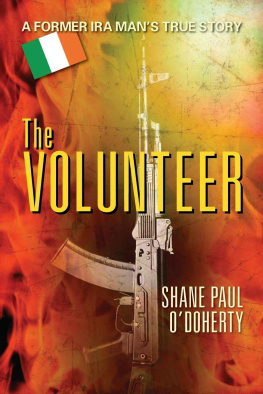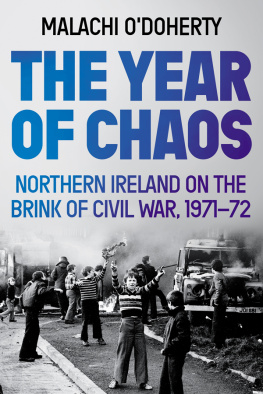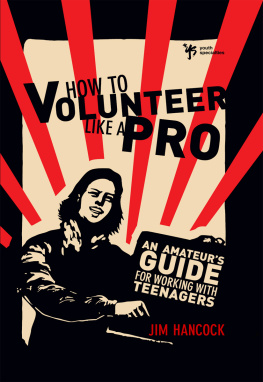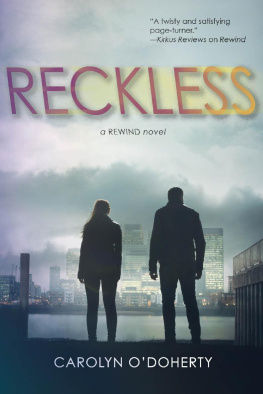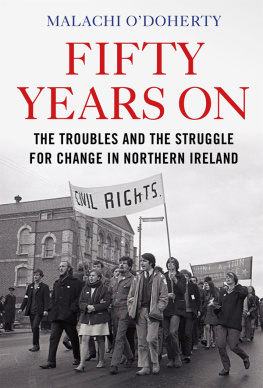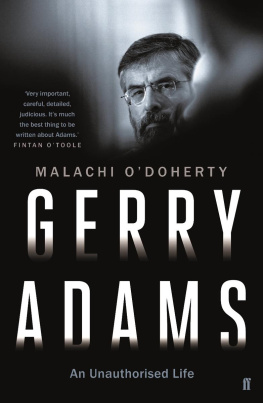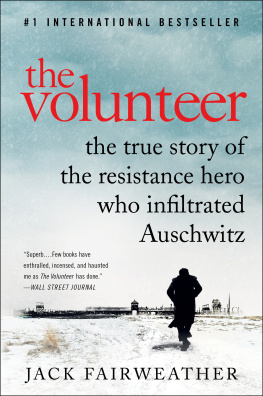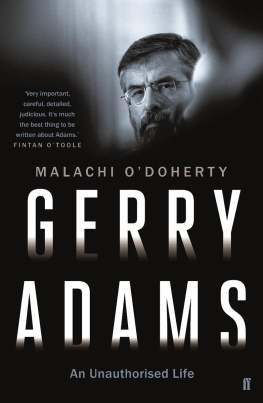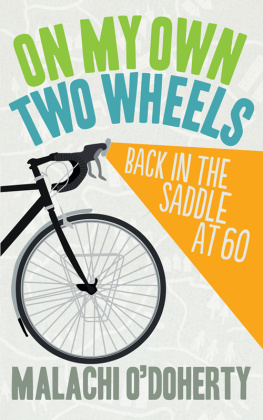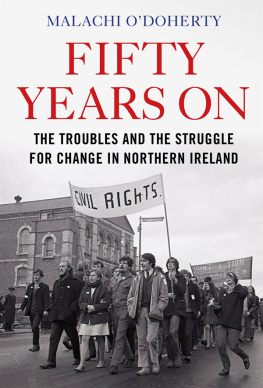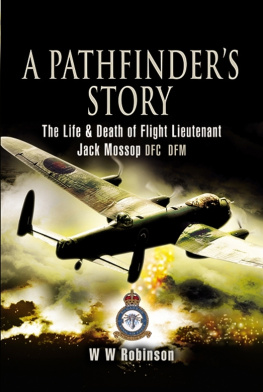It has not been easy to write this book. The subject-matter is so contentious that it will satisfy few and annoy many. I have not set out to write a political, sociological or historical study, but a personal recollection. I have resisted the temptation to exploit the advantages of retrospection and research to paint myself as more aware or mature than I actually was. I hope that my story will move people to believe that the need for a negotiated peace was greater than the need for a pyrrhic victory by any party to the Northern Ireland troubles. There is always a path to peace if only we will take it.
Foreword
The Long Corridor at St. Patricks College in Maynooth, Irelands last seminary, is slightly foreboding. The dark halls are lined with pious portraits of the clerics who, since 1795, have educated more than 11,000 Roman Catholic priests. Under the gaze of painted saints and angels on the ceiling, the College Chapels marble mosaic floor looks like something out of Heaven. Outside, there are three Gothic buildings which comprise St. Marys Square, overlooking a lush, green garden, and a pond with rock positioned like stepping stones, designed to symbolize mans spiritual journey toward God.
On a crisp, sunny morning in October 2004, I walked these grounds with Shane ODoherty, through a stone archway into a Gothic quadrangle called St. Josephs Square. We walked along gravel paths that snaked through grassy swaths bathed in bright red flowers. The only sound was that of the birds.
The last time we had gone for a long walk together, a decade earlier, in Shanes hometown of Derry, I was covering the conflict in Northern Ireland for The Boston Globe and Shane was a married man six years removed from prison. Before his arrest, he was the most wanted man in Britain, a hero for the Irish Republican Army because he had carried out a letter-bomb campaign that maimed a dozen people and terrorized millions of others. As we walked through Derry, we paused at the rooming house for British soldiers where he had planted his first bomb in 1970, when he was 15 years old. We passed the spot in the Bogside where Barney McGuigans brains spilled onto the pavement on Bloody Sunday in 1972, when British paratroopers shot and killed 14 civil rights demonstrators. We walked by the apartment in Crawford Square that Shane had used as a bomb factory, the one that blew up, killing Ethel Lynch, his 22-year-old assistant.
He was given his middle name because he was born on the Feast of the Conversion of St. Paul, who was a terrorist and a murderer before he walked to Damascus. Shanes story is not about a miraculous, religious conversion as much as a gradual, spiritual evolution. He had a tug of war with God, and God won. His odyssey, from teenage revolutionary to a prisoner of nearly 15 years to middle-age seminarian back to ordinary Irishman is a story of redemption.
Hell, he says, shrugging. If I can be saved, anyone can. In 1965, when he was 10 years old, Shane tore a sheath of paper from loose-leaf notebook he used to copy lessons at school and wrote this pledge: When I grow up, I, Shane Paul ODoherty, want to fight and, if necessary, die for Irelands freedom.
Even at his tender age, he knew his words were seditious, because he lived in a corner of Ireland still under British rule, and so he hid them, under the floorboards in the attic of his familys home, and forgot about them until ten years later, when he was sitting in an interrogation room, and a detective shoved the yellowed paper under his nose. He blushed, more embarrassed by his childish idealism than terrified at the prospect of spending the rest of his life in prison.
Shane was born in Derry, in 1955, during a winter so cold his mother called him the Snow Baby. Unlike Northern Ireland as a whole, Derry had a Catholic majority, and an established Catholic middle class, one of the reasons the Catholic civil rights movement bloomed there in the late 1960s. Shane was part of that middle class, one of eight kids in a family that wasnt especially political. His father was a teacher and principal at a Catholic school run by the Christian Brothers. His mother hailed from a prominent business family. Two of his uncles fought the British in Irelands war of independence in the 1920s. But Shanes father never spoke of any of this and quietly aspired to unity with the Irish Republic while opposing violence as a means of achieving it. Despite holding the majority in Derry, Catholics were excluded from exercising power in a normal democracy through gerrymandering and other discriminatory practices of the Protestant unionist government that was loyal to Britain. London looked the other way, until 1969.
Most of the ODohertys neighbors were Protestant, and Shane grew up never hearing a sectarian word at his dinner table. But as a child, he sat alone in his familys well-stocked library, reading about Irish history.
There was something about the tragedy of British rule in Ireland, against the wishes of the Irish people, he says.
He was spellbound reading about the Easter Rising of 1916, when a quixotic band of patriots staged a rebellion they knew was doomed. It was a blood sacrifice, meant to fail, to trick the British into overreacting, and of course the Brits did. They always did, when it came to Ireland. If the Irish never forgot their history, sometimes to their detriment, the British never remembered theirs, invariably to their detriment.
As a 10-year-old, Shane ODoherty offered himself up to martyrdom, which was something of an empty pledge, not because of his age, but because at the time, there was no rebellion. The IRA, widely regarded as a small, impotent bunch of dreamers with a handful of rusty guns, was dormant.
But that all changed when the Protestant unionist governments response to the demands of the Catholic civil rights movement was to beat protesters off the streets. In 1968 and 1969, around the time Shane was entering adolescence and should have been chasing girls, he began chasing IRA recruiters. Derry convulsed with protest and attacks on demonstrators by loyalist mobs and the predominantly Protestant police force. By the time British troops were deployed, ostensibly to keep the peace, Shane had thrown a Molotov cocktail at police and the IRA had become active again. A new group, the Provisional IRA, or the Provos, had sprung up, determined to bring the fight to the British, and 15-year-old Shane ODoherty began an almost farcical search for them, knocking on doors, so he could join. He eventually found two men who inducted him into the secret, illegal organization.
I was no longer an insignificant teenager, he said. I became heroic overnight. I felt almost drunk with power.
At 16, he threw nail bombs at British soldiers and almost hoped hed be shot dead, fantasizing that his blood sacrifice, like that of the martyrs of the Easter Rising, would inspire a mural, or better yet, a song, ensuring his immortality. He jumped out of alleys, firing a primitive, six-shot revolver at soldiers armed with automatic rifles. In 1971, he fired a rocket at a British Army observation tower. It missed, but hit another army post by dumb luck. Soldiers opened fire on a passing car, wounding an innocent woman and two children. Shane went home and prayed that the woman and her children would survive. They did, but his having unwittingly almost caused their deaths shook him. He stopped reporting for duty.

